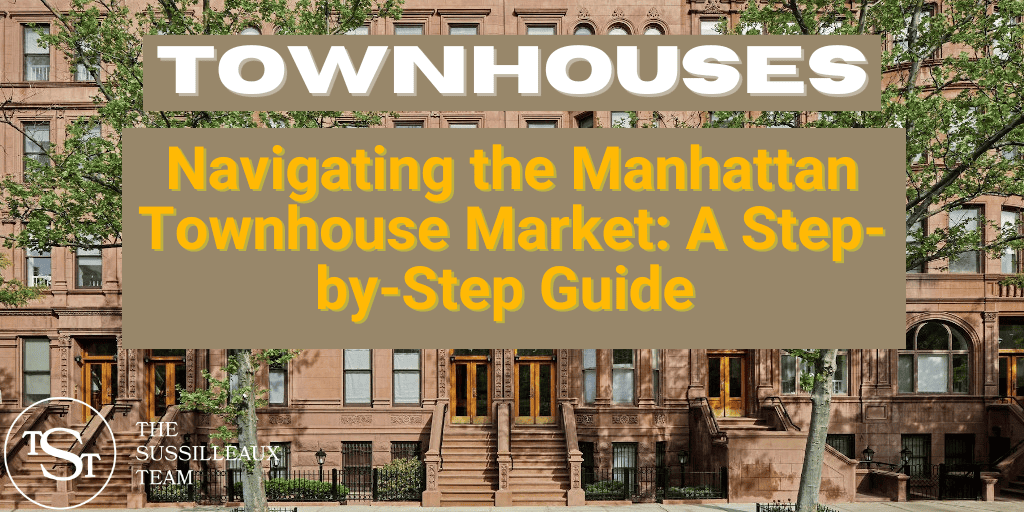Understanding the Manhattan Townhouse Market as a Buyer
Introduction
In my professional role as a licensed associate real estate broker selling Manhattan and Brooklyn real estate, I work with many buyers who are interested in purchasing an iconic Manhattan townhouse.
Townhouses are wonderful options representing the historical significance of New York, coupled with the benefit of private building ownership in a landscape dominated by multifamily buildings.
But the majority of people aren’t familiar with specifics of what to expect and how to proceed when looking at purchasing a townhouse.
Dina and I assembled this guide to help you familiarize yourself with some of the details. So please dive in, and feel free to reach out to us with any questions you may have or for assistance in your journey.
Townhouse Types and Architectural Styles
Manhattan is known for its diverse architectural styles, from the classic brownstones and limestone townhouses to modern, sleek designs. When navigating the Manhattan townhouse market, it’s essential to have a clear understanding of the various types of townhouses available and their respective architectural styles. This knowledge will allow you to better identify your preferences and streamline your property search.
Popular Manhattan Neighborhoods for Townhouses
The Manhattan townhouse market is spread across various neighborhoods, each with its unique charm and appeal. Some of the most popular neighborhoods for townhouses include the Upper East Side, Upper West Side, Greenwich Village, Chelsea, and Harlem. Exploring these neighborhoods will help you determine which area best suits your lifestyle and preferences, considering factors such as access to transportation, schools, restaurants, and shopping centers.
Pricing Factors and Market Trends
The Manhattan townhouse market is influenced by many factors, including location, property size, architectural style, scarcity, and overall market conditions. Staying informed about current market trends and understanding how these factors impact pricing will help you make more informed decisions when buying a townhouse. Additionally, working with an experienced real estate agent who can provide valuable insights into current market conditions and help you identify the best opportunities.
Establishing Your Townhouse Buying Criteria
Location and Proximity to Amenities
When searching for a townhouse in Manhattan, it’s essential to consider your ideal location and the proximity to various amenities. Think about your daily routines, such as work, school, and leisure activities, and determine which neighborhoods offer the most convenience. Additionally, consider factors like access to public transportation, parks, and cultural institutions when evaluating a property’s location.
Size, Layout, and Outdoor Space
Townhouses in Manhattan come in various sizes and layouts. Carefully consider your needs and preferences when establishing your buying criteria. Factors to consider include the number of bedrooms and bathrooms, the availability of outdoor space (such as a garden or terrace), and the overall layout and flow of the property. Keep in mind that larger townhouses are typically much more expensive, may also require more maintenance and higher property taxes.
PRO TIP: Width matters. Because townhouses tend to go back fairly deeply on an already narrow lot, and the side walls abut to your neighbors, (no side windows), townhouses can seem long and narrow with little natural light. The wider the building, the more open and bright the space feels. 15 and 16 foot wide homes are on the narrow side, 17 to 19 feet wide are very comfortable, and 20 feet wide and above are in the luxurious category in terms of width.
Condition, Renovation Potential, and Historic Significance
Manhattan townhouses can vary significantly in terms of their condition, renovation potential, and historic significance. When evaluating properties, determine whether you’re willing to undertake renovations or prefer a move-in ready home. Additionally, consider whether a property’s historic status is essential to you, as this may impact future renovation possibilities and the overall value of the townhouse.
Assembling Your Real Estate Team
Working with a Knowledgeable Real Estate Agent
A knowledgeable real estate agent is an invaluable resource when navigating the Manhattan townhouse market. They can help you identify the best properties based on your criteria, provide insights into local market trends, and guide you through the negotiation process. When selecting a real estate agent, look for someone with experience in the Manhattan townhouse market and a strong track record of successful transactions.
Between the two of us, Dina and I have over 40 years of experience buying and selling NYC real estate with an emphasis on townhouse sales. We are happy to meet with you and discuss your personal situation and options. You can reach us HERE.
Partnering with a Mortgage Broker or Lender
Financing is a critical aspect of purchasing a townhouse in Manhattan. Partnering with a mortgage broker or lender can help you identify the best financing options for your needs and secure a pre-approval, which will strengthen your position when making an offer. Be sure to compare various lenders and loan programs to find the most competitive interest rates and terms.
Engaging Real Estate Attorneys and Home Inspectors
Working with a real estate attorney and a home inspector is crucial for a successful townhouse purchase. A real estate attorney will help you navigate the legal aspects of the transaction, review contracts, and ensure a smooth closing process. A home inspector, on the other hand, will evaluate the property’s condition and identify any potential issues or concerns. Engaging these professionals early in the process can save you time and money in the long run.
Conducting a Comprehensive Property Search
Using Online Resources and Real Estate Listings
You can begin your preliminary property search by using online resources and real estate listings to explore available townhouses in Manhattan. Websites like StreetEasy provide detailed property information, including photos, descriptions, and pricing. These resources can help you create a shortlist of properties that match your buying criteria. The next step is to engage an experienced real estate broker. While it is possible to “go it alone” for generic condominium or co-op properties, every townhouse is unique, and there is no substitute for the guidance of someone who has see hundreds of townhouses of all varieties.
Attending Open Houses and Private Showings
Attending open houses and scheduling private showings are essential steps in finding your dream townhouse. Open houses allow you to view multiple properties in a short period, while private showings provide a more in depth experience. Use these opportunities to ask questions, evaluate the property’s condition, and determine whether the townhouse meets your needs and preferences.
Networking and Off-Market Properties
In addition to using online resources and attending open houses, networking can play a vital role in finding the perfect Manhattan townhouse. Engage with your real estate agent to learn more about off-market properties and exclusive listings. These connections may lead you to unique opportunities that aren’t available to the general public.
PRO TIP: While I can’t say that these opportunities never exist, they are rare, and when they do, you will not be the first in line to access the property. Think about it: If you owned a multi-million dollar asset whose true market value isn’t clearly defined, why would you offer it privately to a handful of people and not maximize your return by selling it on the open market? So keep your eyes and ears open, but don’t count on an off-market opportunity as your primary strategy.
Financing Your Manhattan Townhouse
Understanding Mortgage Options and Requirements
There are various mortgage options available for Manhattan townhouse buyers, including conventional loans, jumbo loans, FHA loans, and VA loans. Each loan program has different requirements, such as credit scores, down payment amounts, and debt-to-income ratios. Research these options and consult with a mortgage broker or lender to determine the best financing solution for your situation.
Preparing Your Financial Documents
To secure financing for your townhouse purchase, you’ll need to provide a variety of financial documents, including tax returns, pay stubs, bank statements, and credit reports. Start gathering these documents early in the process to avoid delays and ensure a smoother mortgage application experience.
Securing Mortgage Pre-approval
Obtaining a mortgage pre-approval is a critical step in the home buying process. A pre-approval letter demonstrates your financial credibility and indicates that a lender is willing to finance your townhouse purchase up to a certain amount. This can give you a competitive edge when making an offer, as sellers often prioritize buyers with pre-approval letters.
Making an Offer and Negotiating the Deal
Evaluating Comparable Sales and Market Data
Before making an offer on a Manhattan townhouse, evaluate comparable sales and market data to determine a fair offer price. Your real estate agent can help you analyze recent sales of similar properties in the area and provide insights into current market conditions. This information will help you craft a competitive offer that maximizes your chances of success.
Crafting a Competitive Offer
When crafting your offer, consider factors such as the property’s condition, local market trends, time on market, and the seller’s motivations. In addition to the offer price, include any contingencies (such as financing or inspection) and a proposed closing date. Work closely with your real estate agent to create an offer that is both attractive to the seller and protects your interests.
Handling Counteroffers, Multiple Offers, and Contingencies
In a competitive market like Manhattan, you may encounter counteroffers, multiple offer situations, and contingencies. Be prepared to negotiate and adapt your offer accordingly. Your real estate agent can provide guidance on the best strategies for addressing these situations and help you navigate the negotiation process to secure the best possible deal.
Completing the Purchase Process
Conducting Home Inspections and Appraisals
Once your offer is accepted, it’s essential to conduct a thorough home inspection and appraisal. A home inspection will identify any potential issues with the property, such as structural concerns or outdated systems, while an appraisal will help ensure that you’re paying a fair price for the townhouse. Address any concerns that arise during these processes with your real estate agent and consider negotiating repairs or adjustments to the purchase price, if necessary.
Finalizing Mortgage Approval and Loan Terms
After your lender completes the appraisal, work with your mortgage broker or lender to finalize your mortgage approval and loan terms. This may involve submitting additional documentation or addressing any concerns raised by the lender. Once your mortgage is approved, you’ll receive a loan commitment, which is a critical step towards closing the deal.
Closing the Deal and Moving In
The final step in purchasing a Manhattan townhouse is closing the deal. At the closing, you’ll sign various legal documents, transfer the funds for the purchase, and receive the keys to your new home. Your real estate attorney will guide you through this process and ensure that all necessary paperwork is completed accurately. Once the transaction is complete, it’s time to move in and enjoy your new Manhattan townhouse!
Conclusion
Navigating the Manhattan townhouse market can be a complex and exciting journey. By following this step-by-step guide and working with experienced professionals, you can streamline the process and make informed decisions throughout your property search. From understanding the market to securing financing and closing the deal, thorough research and planning are crucial to achieving success in the Manhattan townhouse market.
Dina and I are happy to walk you through this in more detail, and just as every townhouse is unique, so is every townhouse buyer!
Further Reading
You can return to The Complete Guide to Manhattan Townhouses, go to the preceding article; Financing a Manhattan Townhouse: Tips and Options, or read the next article in the townhouse buying series: The Role of Your Real Estate Agent in Buying Manhattan Townhouses
requently Asked Questions (FAQs)
- What strategies can I use to find off-market or exclusive Manhattan townhouse listings?
- What are some tips for attending open houses and making the most of the experience?
- How important is it to have a pre-approval letter when making an offer on a Manhattan townhouse?
- What should I look for during a private showing of a Manhattan townhouse?
- What are some common issues or red flags to be aware of when buying a townhouse in Manhattan?
What strategies can I use to find off-market or exclusive Manhattan townhouse listings?
To find off-market or exclusive Manhattan townhouse listings, the best method is to work with a knowledgeable and well-connected real estate agent who may have access to off-market properties and exclusive listings. To be frank, off-market opportunities are rare, and there is almost always a negative reason why a property is available for sale, but not publicly listed. Most often, there are major structural or legal issues associated with such buildings. Ask yourself this: were a building to be unencumbered, why would the seller limit their upside by not listing the property publicly where they would reach the largest pool of qualified buyers possible?
What are some tips for attending open houses and making the most of the experience?
When attending open houses, keep these tips in mind to make the most of the experience: Arrive no later than with a half hour remaining to have sufficient time to explore the property. Come prepared with a list of questions to ask the listing agent that you’ve prepared with your broker about the property’s history, condition, and any known issues. Take photos and notes during your tour to help you remember key details, and pay close attention to aspects like natural light, layout, and storage space. After the open house, discuss your impressions with your real estate agent and consider whether the property aligns with your needs and budget.
How important is it to have a pre-approval letter when making an offer on a Manhattan townhouse?
Having a pre-approval letter is crucial when making an offer on a Manhattan townhouse. A pre-approval letter shows sellers that you are a serious buyer with the financial means to purchase their property. This can give you a competitive edge in a tight market and may make the difference between having your offer accepted or passed over for another buyer. Additionally, a pre-approval letter helps you understand your budget, allowing you to focus on properties within your price range and avoid wasting time on unattainable townhouses.
What should I look for during a private showing of a Manhattan townhouse?
During a private showing of a Manhattan or Brooklyn townhouse, pay attention to the following factors: Inspect the property’s structural components, such as the foundation, roof, and walls, for any signs of damage or wear. Examine the home’s systems, including plumbing, electrical, and HVAC, to ensure they are in good working order. Observe the neighborhood and consider factors like noise levels, parking availability, and proximity to amenities. Lastly, try to envision yourself living in the space and consider whether the townhouse meets your needs in terms of layout, size, and overall feel.
What are some common issues or red flags to be aware of when buying a townhouse in Manhattan?
When buying a townhouse in Manhattan, be aware of these common issues and red flags: Older townhouses may have outdated electrical or plumbing systems that require expensive upgrades. Structural issues, such as foundation problems or water damage, can also be costly to repair. Additionally, be cautious of properties with a history of pest infestations, as these can be challenging to address completely. Finally, consider the expenses to run the building. Inefficient systems can use more energy or water, and annual real estate taxes can vary widely from block to block.





